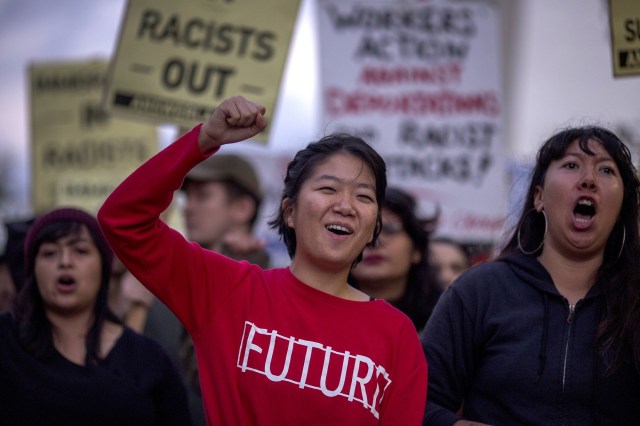Credit: David McNew/Getty Images

Last month, a student committee at Oxford University’s Balliol College banned the Christian Union from taking part in the college’s ‘freshers’ fair’. The decision was eventually overturned, but was seen as indicative of the spirit of intolerance taking hold of campuses in Britain and America.
It’s not just Christians who have found their right to free expression curtailed. Others who have been ‘no-platformed’, dis-invited or subject to sometimes violent protest include conservatives, pro-lifers, secularists who criticise Islamic extremism and feminists who don’t fully agree with the transgender rights movement.
‘Controversial’ visiting speakers, from Charles Murray to Germaine Greer, have been prevented from presenting to students, while other academics have been hounded out of their own institutions after inadvertently ‘offending’ student activists.
Are these incidents unrelated or part of a general trend? Writing for the New York Times, Clay Routledge reviews the evidence that the younger the generation, the weaker its support for free speech:
“A 2015 poll from the Pew Research Center found that 40 percent of millennials (ages 18 to 34) believe the government should be able to regulate certain types of offensive speech. Only 27 percent of Gen-Xers (ages 35 to 50), 20 percent of baby boomers (ages 51 to 69) and 12 percent of the silent generation (ages 70 to 87) share that opinion.”
This doesn’t just appear to be a function of youthful leftwingery:
“A 2016 Gallup survey found that a majority of both Democratic and Republican students believe colleges should be allowed to restrict speech that is purposely offensive to certain groups… And a survey published by the Brookings Institution in September found that 20 percent of Democratic and 22 percent of Republican students agreed it was acceptable for student groups to use violence to prevent a person from speaking.”
Routledge blames this worrying trend on over-protective parenting:
“…somewhere along the way, protecting children from needless harm became conflated with shielding them from stressors and uncertainties… that are critical for developing personal independence.”
In other words we are bringing up our children to be more fearful:
“Fear, in all its forms, is at the heart of these issues — fear of failure, ridicule, discomfort, ostracism, uncertainty. Of course, these fears haunt all of us, regardless of demographics. But that is precisely the point: Our culture isn’t preparing young people to grapple with what are ultimately unavoidable threats. Indeed, despite growing up in a physically safer and kinder society than past generations did, young Americans today report higher levels of anxiety.”
But what if young people have good reason to be anxious – and, in particular, to be anxious about the way that people now use their right to free speech?
The coarsening effect of social media on public and private discourse is something that affects all age groups, but especially the young – in whose lives digital communication plays an increasingly dominant and formative role.
Of course, childhood and adolescence have always been haunted by fears of “failure, ridicule, discomfort, ostracism, uncertainty”. And bullies, whether of the schoolyard or staffroom variety, don’t need smartphones to find their victims. However, there are several reasons why things are worse online:
- Online anonymity is a great enabler of aggression – and for those on the receiving end, not knowing the aggressor’s identity engenders paranoia.
- The digital world places no limits on the number of people who can gang up on you – one false move and your humiliation can go viral.
- If you feel compelled to be online every waking hour then there’s no refuge from your enemies – no ‘safe space’.
- In online debate, opinion is shorn of its human context – you don’t actually engage with the person you’re arguing with, only their words. The whole encounter centres on your disagreement, not what you have in common.
Finally, digital talk is cheap. In the pre-digital age the ability to broadcast far and wide was a limited resource and words were chosen with care. The gatekeepers of public communication were in a privileged position, but with the associated responsibilities. Now we all have the privilege, but not, it seems, the responsibility.
All freedoms fall into disrepute when used irresponsibly.










Join the discussion
Join like minded readers that support our journalism by becoming a paid subscriber
To join the discussion in the comments, become a paid subscriber.
Join like minded readers that support our journalism, read unlimited articles and enjoy other subscriber-only benefits.
Subscribe